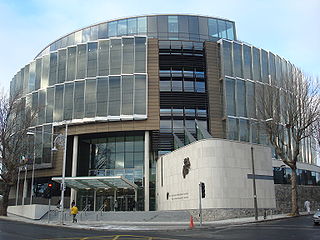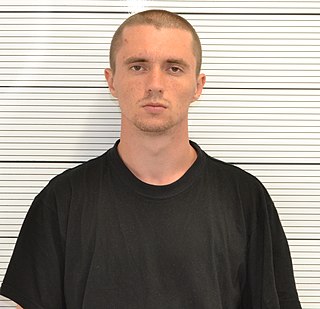Life imprisonment is any sentence of imprisonment for a crime under which convicted criminals are to remain in prison for the rest of their natural lives. Crimes that warrant life imprisonment are usually violent and/or dangerous. Examples of crimes that result in life sentences are murder, torture, terrorism, child abuse resulting in death, rape, espionage, treason, drug trafficking, drug possession, human trafficking, severe fraud and financial crimes, aggravated criminal damage, arson, hate crime, kidnapping, burglary, and robbery, piracy, aircraft hijacking, and genocide.

Richard Colvin Reid, also known as the Shoe Bomber, is the perpetrator of the failed shoe bombing attempt on a transatlantic flight in 2001. Born to a father who was a career criminal, Reid converted to Islam as a young man in prison after years as a petty criminal. Later he became radicalized and went to Pakistan and Afghanistan, where he trained and became a member of al-Qaeda.

The Terrorism Act 2000 is the first of a number of general Terrorism Acts passed by the Parliament of the United Kingdom. It superseded and repealed the Prevention of Terrorism Act 1989 and the Northern Ireland Act 1996. It also replaced parts of the Criminal Justice Act 1998. The powers it provides the police have been controversial, leading to noted cases of alleged abuse, and to legal challenges in British and European courts. The stop-and-search powers under section 44 of the Act have been ruled illegal by the European Court of Human Rights.
The defence of property is a common method of justification used by defendants who argue that they should not be held liable for any loss and injury that they have caused because they were acting to protect their property.
There is no consensus, scholarly or legal, on the definition of terrorism.

The Special Criminal Court is a juryless criminal court in Ireland which tries terrorism and serious organised crime cases.
On Thursday, 21 July 2005, four attempted bomb attacks by Islamist extremists disrupted part of London's public transport system as a follow-up attack from the 7 July 2005 London bombings that occurred two weeks earlier. The explosions occurred around midday at Shepherd's Bush, Warren Street and Oval stations on the London Underground, and on London Buses route 26 in Haggerston on Hackney Road. A fifth bomber dumped his device without attempting to set it off.

The Terrorism Act 2006 is an act of the Parliament of the United Kingdom that received royal assent on 30 March 2006, after being introduced on 12 October 2005. The Act creates new offences related to terrorism, and amends existing ones. The Act was drafted in the aftermath of the 7 July 2005 London bombings, and some of its terms have proven to be highly controversial. The government considered the act a necessary response to an unparalleled terrorist threat; it has encountered opposition from those who feel that it is an undue imposition on civil liberties, and could increase the terrorism risk.

In criminal law, the term offence against the person or crime against the person usually refers to a crime which is committed by direct physical harm or force being applied to another person.

Terrorist and Disruptive Activities (Prevention) Act, commonly known as TADA, was an Indian anti-terrorism law which was in force between 1985 and 1995 under the background of the Punjab insurgency and was applied to whole of India. It was originally assented to by the President on 23 May 1985 and came into effect on 24 May 1985. This act was intended to halt the Khalistani Movement, an armed Sikh separatist movement present in Punjab. It later expanded to encompass other states as well. The Act had a sunset provision for lapsing after two years post-commencement, which it did on 24 May 1987. The Parliament not being in session, the life of the Act could not be extended. But the provisions were kept alive by an ordinance effective from the expiry date of the Act. This ordinance was later replaced with the Terrorist and Disruptive Activities (Prevention) Act, 1987. It was assented to on 3 September 1987, and made effective in two parts from 24 May 1987 and 3 September 1987. This also had a sunset provision of two years from 24 May 1987. It was renewed in 1989, 1991 and 1993 before being allowed to lapse in 1995 due to increasing unpopularity after widespread allegations of abuse. It was the first anti-terrorism law legislated by the government to define and counter terrorist activities.
Title VIII: Strengthening the criminal laws against terrorism is the eighth of ten titles which comprise the USA PATRIOT Act, an anti-terrorism bill passed in the United States one month after the September 11, 2001 attacks. Title VIII contains 17 sections and creates definitions of terrorism, and establishes or re-defines rules with which to deal with it.
The Talbot Street bomb-making haul, on 28 September 2006, had two men arrested in the north of England and charged under the Explosive Substances Act 1883 for the possession of rocket launchers and a large haul of explosives-making chemicals. The case went virtually unreported in the national press until the trial.
The 2004 financial buildings plot was a plan led by Dhiren Barot to attack a number of targets in the U.S. and the United Kingdom which is believed to have been approved by al-Qaeda. The evidence against the plotters consisted of home videos, written notes, and files on computers. At the time of the arrests the group had no funding, vehicles, or access to bomb-making equipment.

Property crime is a category of crime, usually involving private property, that includes, among other crimes, burglary, larceny, theft, motor vehicle theft, arson, shoplifting, and vandalism. Property crime is a crime to obtain money, property, or some other benefit. This may involve force, or the threat of force, in cases like robbery or extortion. Since these crimes are committed in order to enrich the perpetrator they are considered property crimes. Crimes against property are divided into two groups: destroyed property and stolen property. When property is destroyed, it could be called arson or vandalism. Examples of the act of stealing property is robbery or embezzlement.
New Zealand has experienced few terrorist incidents in its short history and the threat is generally regarded as very low. However, the Security Intelligence Service (SIS) has warned against complacency. This article serves as a list and compilation of past acts of terrorism, attempts of terrorism, and other such items pertaining to terrorist activities within New Zealand. Significant acts of terrorism include the bombing of the Rainbow Warrior in 1985, and the Christchurch mosque shootings in 2019, which killed 51 people and injured 40 others.
A law enforcement agency (LEA) has powers, which other government subjects do not, to enable the LEA to undertake its responsibilities. These powers are generally in one of six forms:

Pavlo Serhiyovych Lapshyn is a Ukrainian white supremacist terrorist who committed crimes in 2013 against Muslims in the United Kingdom. Lapshyn was given a life sentence, and will serve a minimum of 40 years, for a murder in Birmingham and three attempted bombings of mosques in the West Midlands. He confessed to police that his motivation was to kill and harm non-whites.

The Explosives Act 1957, is a Malaysian laws which enacted relating to the manufacture, use, sale, storage, transport, import and export of explosives.

On 15 September 2017, at around 08:20 BST, an explosion occurred on a District line train at Parsons Green Underground station, in London, England. Thirty people were treated in hospital or an urgent care centre, mostly for burn injuries, by a botched, crude "bucket bomb" with a timer containing the explosive chemical TATP. Police arrested the main suspect, 18-year-old Iraqi asylum seeker Ahmed Hassan, in a departure area of the Port of Dover the next day, and subsequently raided several addresses, including the foster home of an elderly couple in Sunbury-on-Thames where Hassan lived following his arrival in the United Kingdom two years earlier claiming to be an asylum seeker.








